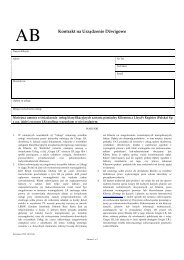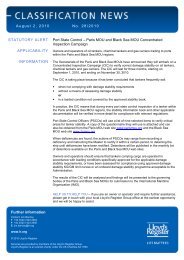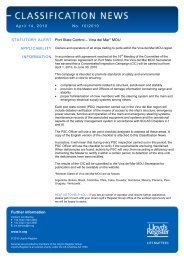A special Lloyd's Register Horizons supplement
A special Lloyd's Register Horizons supplement
A special Lloyd's Register Horizons supplement
You also want an ePaper? Increase the reach of your titles
YUMPU automatically turns print PDFs into web optimized ePapers that Google loves.
<strong>Horizons</strong> <strong>supplement</strong> February 2012<br />
The technology revolution<br />
The techn l gy<br />
rev luti n<br />
Twenty-first-century technology is changing so<br />
rapidly that the need for safety devices and rule<br />
changes to protect owners and enhance operational<br />
performance has never been greater.<br />
The sheer speed, scale and invention<br />
of today’s products have set everhigher<br />
and more rigorous standards<br />
for owners and shipyards to absorb<br />
and follow.<br />
Which is where Lloyd’s <strong>Register</strong> comes in.<br />
Our Marine Technology Plan covers the<br />
key aspects of design and technology<br />
to give owners and shipyards the high<br />
level of safety and security that today’s<br />
high-tech innovations and engineering<br />
usually require.<br />
Taking a strategic view<br />
The importance of strategic research is<br />
vital. Lloyd’s <strong>Register</strong>’s Strategic Research<br />
Group provides the ability to respond to<br />
the medium and long term requirements<br />
of maritime industry stakeholders.<br />
A strategic vision<br />
In order to maximise the value of<br />
disparate research and technology<br />
development planning efforts that<br />
take place concurrently in many<br />
parts of the organisation, we have<br />
developed a forward looking strategic<br />
technology vision.<br />
The scale of the projects included in the<br />
Marine Technology Plan varies and can<br />
change as new products are developed.<br />
Here we summarise some of the projects<br />
detailed in our January <strong>Horizons</strong> magazine:<br />
we featured a group that ranges from<br />
computational fluid dynamics (CFD) to the<br />
human factors involved in the running of<br />
a ship.<br />
• What exactly is CFD It is an online<br />
alternative to the use of scale models<br />
to study and solve problems and faults<br />
on vessels and marine engineering<br />
products. Lloyd’s <strong>Register</strong>’s Technical<br />
Investigation Department uses CFD to<br />
analyse and assess the extent of, say, a<br />
damaged propeller or a rudder on a bulk<br />
carrier and, in many cases, predict the<br />
likelihood of the problem re-occurring.<br />
Owners have also used this sophisticated<br />
software to help trim their fuel bills.<br />
• A team from Lloyd’s <strong>Register</strong>’s Marine<br />
Product Development department is<br />
currently studying the IMO’s Energy<br />
Efficiency Design Index (EEDI) and how<br />
it can benefit owners of certain types of<br />
ship. Lloyd’s <strong>Register</strong> has been working<br />
closely with technology providers,<br />
owners and shipyards to enable us to<br />
support the verification of energy-saving<br />
technologies on ships.<br />
• The human element is involved in every<br />
stage of a ship’s lifecycle – from the<br />
training, recruitment and management<br />
of employees to the systems used on<br />
ships, the supply chains and the endusers.<br />
A Lloyd’s <strong>Register</strong> project looks<br />
at the interaction between the technical<br />
and the operational side of life on a<br />
vessel and how the study of human<br />
factors can improve this.<br />
• As technology changes and becomes<br />
more sophisticated, the need for sturdier<br />
fire and lifesaving equipment rules<br />
and standards in design and materials<br />
has become evermore crucial. Lloyd’s<br />
<strong>Register</strong> is studying the problems and<br />
accidents caused by poorly designed<br />
equipment. This will help us to establish<br />
rules and regulations for new technology<br />
to make sure it is fit for purpose.<br />
Lloyd’s <strong>Register</strong>’s technology teams<br />
Technical leadership, based on strategic<br />
research and development, is at the heart<br />
of Lloyd’s <strong>Register</strong>’s Marine ambitions.<br />
The ability to understand technology and<br />
its applications enhances our technical<br />
capability to maintain and support the<br />
industry as a leading Classification Society.<br />
Technology and investigation leadership<br />
Our global technology leaders provide the<br />
guidance and professional understanding<br />
in the key areas of hull structures,<br />
engineering systems, materials and<br />
welding, risk and electro-technical<br />
systems. As the heads of Lloyd’s <strong>Register</strong>’s<br />
global technical community within their<br />
specific disciplines, each oversees our<br />
internal governance framework to ensure<br />
technology is applied consistently by<br />
colleagues worldwide.<br />
Their work is vital in allowing and guiding<br />
the constant development and evolution of<br />
our technical capability.<br />
Lloyd’s <strong>Register</strong>’s Technical Leaders: (l-r)<br />
Ed Fort, Head of Marine Engineering<br />
Systems; Peter Thompson, Head of Hull<br />
Structures; Bernard Twomey, Head of<br />
Electrotechnical Systems; Vince Jenkins,<br />
Global Marine Risk Adviser; David<br />
Howarth, Chief Metallurgist and Global<br />
Head of Materials, Welding and NDE<br />
In November, Lloyd’s <strong>Register</strong> marked<br />
half a century in Korea and celebrated<br />
by holding the Korea 50-50 Forum for<br />
the Future – celebrating the last 50 but<br />
looking ahead at the next 50 years.<br />
Lloyd’s <strong>Register</strong>’s Chief Executive,<br />
Richard Sadler, spoke on the need<br />
for, ‘technology to be at the heart of<br />
solutions’ to the challenges that business<br />
and shipping faces. “Future society<br />
will have to be better educated about<br />
eco-efficiency”, he said. “Economists,<br />
engineers and academics will be central<br />
to new solutions” in our increasingly<br />
complex world.<br />
Southampton update<br />
By 2014 Lloyd’s <strong>Register</strong> will have occupied<br />
a brand new Group Technology Centre<br />
in Southampton. This will be the global<br />
headquarters for Lloyd’s <strong>Register</strong>’s Marine<br />
business, placing LR at the centre of a<br />
network of shipping industry research<br />
and development.<br />
The decision to choose Southampton<br />
centred on the existence of world-class<br />
marine engineering and naval architecture<br />
schools at Southampton University.<br />
The move to Southampton will be in<br />
parallel with plans to establish a Lloyd’s<br />
<strong>Register</strong> Group Technology Centre in<br />
Singapore – plans for which are well<br />
underway – that will focus on the<br />
Offshore sector.<br />
Lloyd’s <strong>Register</strong>’s Group headquarters<br />
– representing all of Lloyd’s <strong>Register</strong>s<br />
activities – will remain in London.<br />
12<br />
3






